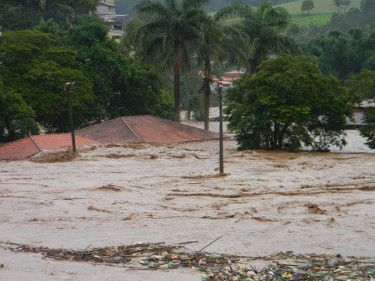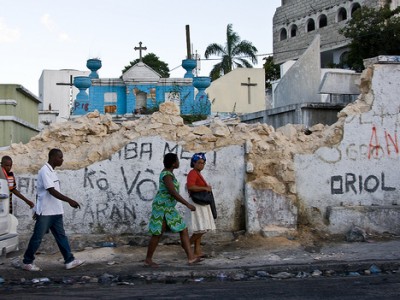Stories about Environment from January, 2011
China: Better metrics for measuring Asian happiness
With Spring Festival just around the corner, Tsinghua University economics professor Andrew Sheng proposes a more enhanced approach to measuring quality of life: We need Stiglitz Report 2.0, with more Asian input.
Taiwan: Product placement and the petrochemical industry
If a petrochemical company treats bloggers to a cushy on-site tour, do posts that follow count as corporate astroturfing? What, as some have alleged, if the excursion was funded by the government? And, what if the bloggers weren't shown the whole story?
D.R. of Congo: UK listed companies want to drill oil in Virunga!
Conservation blogger Samuel Maina is shocked to learn that two companies listed in the London Stock Exchange, SOCO and Dominion, plan to drill for oil in Africa’s oldest park, the Virunga National Park.
Guyana: The Need to Go Green
“I wonder if it is true, that there is a link between Styrofoam and cancer. And if there is, then why we still using it in green land of Guyana?”: Guyana-Gyal is beginning to think that “nobody don’t give a damn.”
Mexico: The “Sistine Chapel of Crystals”
The "Cave of Crystals" in the Mexican town of Naica houses giant crystals known as "Moon Stones." The cave is a deadly place for humans to visit, but through the Internet bloggers are sharing the story behind this mysterious cave.
Russia: Toxic River Caused by Sochi Olympics Development
YouTube-user Volf1959 posted a video [RUS] of a small river Dzyhra next to Sochi that is now covered with toxic layer because of the development of one of the infrastructure for the Sochi 2014 Olympics .
Jordan: Social Media Combats Deforestation Project
The Jordanian government scheduled the building of a new military academy within the Ajloun forest, one of Jordan's few remaining forested areas. Immediately, several pre-existing and ad hoc coalitions sprung to halt the project - working mostly through citizen media to make their voices heard and mobilse support on the ground.
Iran: 14 Lions Killed in Tehran Zoo
Environmental bloggers are angry and concerned about the killing of 14 lions in Tehran Zoo. Iranian media reported that the lions were put down because they were diagnosed with an infectious bacterial disease, glanders, which is more commonly found in horses, donkeys, and mules. Two weeks earlier, a Siberian tiger...
Ecuador: Photos of the Rainforest
Carla Badillo shares photos of her trip to the Ecuadorian rainforest.
Argentina's Agricultural Sector on Strike: Economic or Political Impact?
In its ninth strike since 2008, the agricultural sector in Argentina is trying to generate a “political impact” rather than an “economic impact.” But Eliot Brockner from Latin American Thought argues that “The “political impact” is nothing compared to the billion-dollar economic impact the strikes have had over the past...
Uganda: Does size matter?
Does size matter when talking about population?: “As a reference point for how big Uganda is, one frequent comparison is that it is about the same size as the State of Oregon in the U.S. The current population of Uganda is just over 33 million… It turns out that there...
South Korea: During Foot-and-Mouth Disease Outbreak, A Female Official Died of Fatigue
A female official who handled quarantine work has died of fatigue, South Korea's citizen media, Wiki Tree reported today[ko]. As the country faced its worst foot-and-mouth disease outbreak, the workload for quarantine workers has greatly increased lately.
St. Lucia: Getting Over Tomas
“It will be a long road”: Sun, Rain, Or… says that St. Lucia is still struggling to get back to normal after last year's Hurricane Tomas.
Brazil: Flooding in the Mountainous Region of Rio de Janeiro Devastated Cities
The mountaineous region of Rio de Janeiro is suffering what is being considered Brazil’s most-deadly natural disaster: there are more than 500 fatal victims and countless people left homeless so far. This tragedy, which gives only its first steps in the aid of the victims, still doesn't allow us to assess the damage and the work to be done, but it already brings back the debate about the urgency of creating a policy for climate catastrophes in the country.
Tajikistan: A sliver of hope for economy
Elina Galperin reports that a sizeable amount of natural gas has been found in Tajikistan, enough to cover the country's needs Tajikistan for 50 years.
Haiti: Photo Commentary
A photo posted at The Livesay Haiti Weblog might just be worth a thousand words.
Brazil: São Paulo annual floods and the biased media
Following the floods this week in Brazil, Hugo Albuquerque, from the blog O Descurvo, comments [pt] on the urban problems of the city of Sao Paulo. He also criticizes mainstream media's biased coverage of the issue – the same does Maurício Caleiro, from the blog Cinema e Outras Artes [pt]
Guyana: Adopt-a-Turtle
Guyana-Gyal considers adopting a turtle – but there's a deal-breaker.
Guyana, St. Lucia, Haiti: Where Did The Money Go?
Regional bloggers are reblogging posts that ask where all the Haiti relief money went, given that the country appears to be not much better off a year after the earthquake.
Lebanon: Let's Protest
After -what she considered- so many useless and power-oriented protests, Lebanese blogger Liliane suggested a list of things that she believes are really worth demonstrating for and protesting against. Check her list and her readers suggestions as well in this post.
Haiti: One Year Ago…We Remember
Today marks one year since the devastating earthquake struck Haiti. Haitian bloggers are remembering and paying tribute to the survivors of the disaster, while acknowledging that there is still a lot of work to be done.






